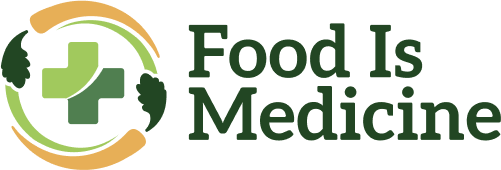Download the Pathways to Enable Food Is Medicine Interventions PDF
Medicaid and Food Is Medicine Interventions
Health-related social needs (HRSN) are an individual’s unmet, adverse social conditions that contribute to poor health outcomes. Food Is Medicine interventions are often part of HRSN policies that have gained significant traction in recent years, with a growing number of state Medicaid agencies embracing the concept of using nutrition-based interventions to prevent and manage chronic health conditions.
The Centers for Medicare and Medicaid Services (CMS) supports states in addressing HRSN through:
- Coverage of clinically appropriate and evidence-based HRSN interventions
- Care delivery transformations, including improvements in data sharing
- Performance measurement to create accountability for HRSN screening and facilitate access to needed supports as part of successful care management.
The specific food and nutrition services provided to Medicaid enrollees depend on the policy authority, local context, and the decision-maker assessment of best alignment.
Specific food and nutrition services should supplement, not supplant, existing federal, state, and local nutrition supports. As outlined by CMS, state Medicaid agencies should partner with other state agencies and social service providers to ensure that beneficiaries experiencing food insecurity are connected to programs such as:
- Supplemental Nutrition Assistance Program (SNAP)
- Special Supplemental Nutrition Program for Women, Infants, and Children (WIC)
- Temporary Assistance for Needy Families (TANF)
Health-Related Social Needs Services Coverage
The Center for Medicare and Medicaid Services published guidance in 2023 on Coverage of Health-Related Social Needs (HRSN) Services in Medicaid and the Children’s Health Insurance Program (CHIP). These services include:
Case management services for access to food and nutrition, such as:
- Outreach and education
- Linkages to other state and federal benefit programs, benefit program application assistance, and benefit program application fees
Nutrition counseling and instruction tailored to health risk, nutrition-sensitive health conditions, and demonstrated outcome improvement, such as:
- Guidance on selecting healthy food
- Healthy meal preparation
Home-delivered meals or pantry stocking tailored to health risk and eligibility criteria, certain nutrition-sensitive health conditions, specifically for children or pregnant individuals, such as:
- Medically tailored meals to high-risk pregnant individuals at risk of or diagnosed with diabetes
Nutrition prescriptions tailored to health risks, certain nutrition-sensitive health conditions, and/or demonstrated outcome improvement, such as:
- Fruit and vegetable prescriptions
- Protein boxes
- Food pharmacies
- Healthy food vouchers
Grocery provisions for high-risk individuals to avoid unnecessary acute care admission or institutionalization
Meal quantities and service duration vary by policy authority. Not previously approved in CHIP HSI.
Food Is Medicine Initiatives Through Medicaid
Children’s Health Insurance Plan: Health Services Initiatives (HSI)
- Additional services and supports for CHIP and/or Medicaid-eligible children under the age of 19
- States use a portion of existing CHIP administrative allotment; up to 10% of CHIP expenditures
- To learn more, download the HSI FAQs and read about Massachusetts' Health Service Initiatives
Home and Community-Based Services Authorities
- States can develop home and community-based services, including waivers (HCBS Waivers) to meet the needs of people who prefer to get long-term care services and supports in their home or community, rather than in an institutional setting.
- These supports can include various food, meal, and nutrition services. Examples of Home and Community-Based Services include:
In Lieu of Services and Settings (ILOSs)
- States and managed care plans can cover services or settings that are substitutes for current or future services or settings covered under the state plan as “in lieu of services and settings” (also known as ILOS).
- The final rule addresses an innovative option that states may consider employing in Medicaid managed care programs to reduce health disparities and address unmet HRSNs.
- Download the PDF of the CMS Information Bulletin: Coverage of Services and Supports to Address HRSNs in Medicaid and CHIP.
- Download the PDF of the State Medicaid Director Letter: Additional Guidance on Use of In Lieu of Services and Settings in Medicaid Managed Care.
- Read about how Michigan is addressing Medicaid members' food and nutrition-related needs through ILOS.
Section 1115 Demonstration Pilots
- States can pilot new approaches to delivering Medicaid coverage, including HRSNs, such as nutrition supports, through Section 1115 Demonstration Waivers.
- Eligible participants include Medicaid enrollees with state-defined qualifying clinical and social risk factors for whom a nutrition-related intervention or service is medically appropriate and evidence-based.
- Visit the KFF Section 1115 Medicaid Waiver Watch website for more detailed information on Section 1115 Demonstration Waiver programs.
- Read about North Carolina's Waiver program design and renewal request process.
Value-Added Services
- Medicaid managed care organizations (MCOs), prepaid inpatient health plans (PIHPs) and prepaid ambulatory health plans (PAHPs) may offer additional services beyond covered contract services which may include Food Is Medicine interventions.
- These value-added services are offered voluntarily by the plan and the cost of these services cannot be included when determining the Medicaid capitation rates paid by a state to a plan.
- Services such as food assistance are offered at the MCO’s discretion.
- Visit the Kaiser Family Foundation website to get the MCO enrollment by state.
- To learn more about approaches to address patient nutrition needs in state Medicaid and CHIP programs, see the Center for Health Law and Policy Innovation (CHLPI) State Medicaid Policy Toolkit (published July 2024).
Select Examples of State Food Is Medicine Programs
North Carolina: Healthy Opportunities Pilot (NC-HOP)
- Case management services
- Food and nutrition access case management services billed in 15-minute interactions
Oregon: Oregon Health Plan (OHP)
- Nutrition counseling and instruction
- Nutrition and cooking eduction
Massachusetts: MassHealth
- Nutrition prescriptions
- Medically tailored or nutritionally-appropriate food prescriptions (i.e., fruit and vegetable prescriptions, protein box), delivered in various forms such as nutrition vouchers and food boxes, for up to 6 months, with options for renewal
California: Cal-AIM
- Home-delivered meals and/or pantry stocking
- Members receive deliveries of nutritious, prepared meals and healthy groceries to support their health needs. Members also receive vouchers for healthy food and/or nutrition education
Medicare Advantage: Food Is Medicine Interventions and Benefits
Medicare Advantage (MA) plans offer Medicare beneficiaries an alternative to Original Medicare through private insurance companies, Medicare Advantage Organizations (MAOs), that contract with Medicare to provide Part A, Part B, and usually Part D.
Plans may offer some extra benefits that Original Medicare does not cover; these are referred to as “supplemental benefits” and can include a variety of FIM interventions.
Opportunities
While MAOs may offer several food- and nutrition-related supplemental benefits, eligibility and supplemental benefits vary by plan.
Special Supplemental Benefits for the Chronically Ill (SSBCIs)
- Allow Medicare Advantage plans to better tailor benefit offerings, address gaps in care, and improve health outcomes for the chronically ill population.
- Enrollees who have one or more comorbid and medically complex chronic conditions that are life threatening or significantly limit the overall health or function of the enrollee; are at high risk of hospitalization or other adverse health outcomes; and require intensive care coordination.
- Examples include:
- Meals beyond a limited basis, either home delivered or offered in a congregate setting
- Food and produce to assist chronically ill enrollees in meeting nutritional needs
Supplemental Benefit
- Provide benefits not covered under Part A, Part B, or Part D but are covered by the MAO
- Must be uniformly available to all enrollees
- General nutritional education furnished by practitioners
- Home-delivered meals immediately following surgery or an inpatient hospital stay, for a temporary duration, typically a four-week period, per enrollee per year, provided they are ordered by a physician or non-physician practitioner
Value-Based Insurance Design Model
- Test a broad array of Medicare Advantage service delivery or payment approaches to more fully address the medical and health-related social needs of beneficiaries, advance health equity, and improve care coordination for patients
- MAOs can target benefit design to enrollees based on chronic condition, socioeconomic status, or place of residence in the most underserved area derivation index (ADI) areas
- Healthy, home-delivered meals for enrollees with low-income subsidy (LIS) status
- Food and produce targeted to assist enrollees with multiple chronic health conditions to improve their nutritional status
- Interventions are based on plan discretion
HRSA Health Center Program
At the direction of the Health Resources and Services Administration (HRSA), HRSA-Supported Health Centers (health centers) are required to provide a set of primary health care services. They may also provide additional health services, including certain specialty services.
HRSA considers specialty services to be within the broad category of "additional" health services defined in Section 330 as services that are not included as required primary health care services and that are:
These services are:
- Necessary for the adequate support of primary health services
- Appropriate to meet the health needs of the population served by the health center
Food Is Medicine Interventions Through Health Centers
Nutrition
- Nutrition services prevent and treat diseases and conditions through nutritional assessment, diagnosis, and treatment
- These services may include medical nutrition therapy, nutrition education and counseling, and other interventions to enhance knowledge and impact behaviors related to healthy eating, nutrition, and health
- These services may include the nutrition services of a WIC program, if the WIC program, if the health center receives USDA WIC program support
Pharmaceutical Services
- Pharmaceutical services provide access to prescribed medications
- These services may include a broad spectrum of functions ranging from the dispensing and tracking medications to pharmacist-delivered patient care services (e.g., disease state management, medication reconciliation, therapeutic monitoring, wellness promotion, and disease prevention)
Additional Enabling Supportive Services
- Additional enabling/supportive services are beyond any required case management services and support a health center patient’s access to nonmedical, social, housing, educational, or other related services
- Such services may include access to food banks and/or meals
Each health center must determine whether adding additional health services as part of an approved scope of a project is appropriate for the population served, demonstrates unmet need, and other relevant factors.
Learn more about HRSA’s service descriptors on Form 5A.




